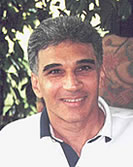Every so often, I like to challenge you to go against your mental instincts. How many of you verbally repeat a technique to yourself after you make a mistake in match play? After a failure, do you immediately think, "I should have bent my knees," or "I need to keep my eye on the ball, my elbow in, my wrist firm, etc."? In your next few matches, I challenge you to not say a word after a failure, not one word about a mechanic. Just move on to the next point. Can you do this?
I'm betting that you have conditioned yourself so much that announcing a mechanic after a failure has become spontaneous and automatic. (By the way, this is not what I had in mind when I teach that tennis must be played in an automatic and spontaneous mode!)
Why have players developed this habit of verbalizing failures? The reasons are twofold. One, they think announcing a failed mechanic will somehow resolve the problem. Two, they unknowingly give themselves an emotional crutch for failure.
Announcing the failed mechanic will not solve the problem in match play. Ninety-nine percent of the time players do not even have the correct technique or the correct reason why a mechanic did not work. A player is much better off practicing mental toughness, forgetting the mistake and moving on. The tendency to announce mistakes is universal; forgetting mistakes and moving on is reserved for a few -- the Tennis Warriors!
Announcing the failure also creates the problem of an emotional crutch. Blaming a missed technique gives a player a reason why he or she has failed, which softens the emotional sting of that failure. If there is a reason for the mistake, then the player does not have to take the total responsibility for that failure. In other words, the player did not fail, but the failure was caused by the technique not being correct! At this point, the player can move on.
Sounds good because the player is moving on, but there is a huge problem! The key to building fortitude and becoming a mentally tough player is to accept failures in the raw. No frills, no excuses, no feeling better, no over-thinking, no denying the failure, no transferring blame. Just the player and the failure face to face, mano a mano, eyeball to eyeball.
What happens after a failure is crucial. Instead of leaning on the crutch of technique, a tough player braces himself, turns and stares down the failure while summoning up all the mental powers at his disposal. The confrontation is obvious. The choices are clear. Raw failure faces raw mental toughness. The player, making the correct decision, suppresses his internal emotional sensitivity and replaces it with the champion-building strength of mental dynamics. The result? The mind controlling the emotions instead of the emotions controlling the mind. A Tennis Warrior is born. The player is learning to think like a pro!
Is this the way the top tennis pros think? Well, how many times have you heard a top player announce after a failed shot that he did not bend his knees, keep his elbow in, keep a firm wrist or any other technique? Some of them may yell out a groan of disapproval, but then they immediately move on to the next point. The best have mastered the habit of confronting raw failure, swallowing the emotional sting, then dining on pure mental toughness. It is the food of Champions!


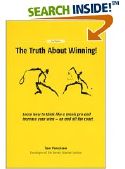
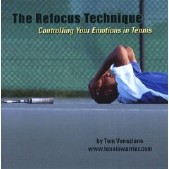
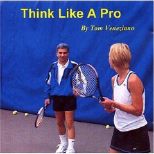
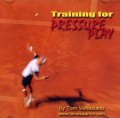



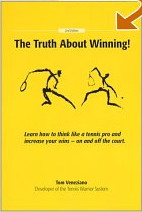
 You will join 13,000 other subscribers in receiving news of updates to the Tennis Server along with monthly tennis tips from tennis pro Tom Veneziano.
You will join 13,000 other subscribers in receiving news of updates to the Tennis Server along with monthly tennis tips from tennis pro Tom Veneziano. 